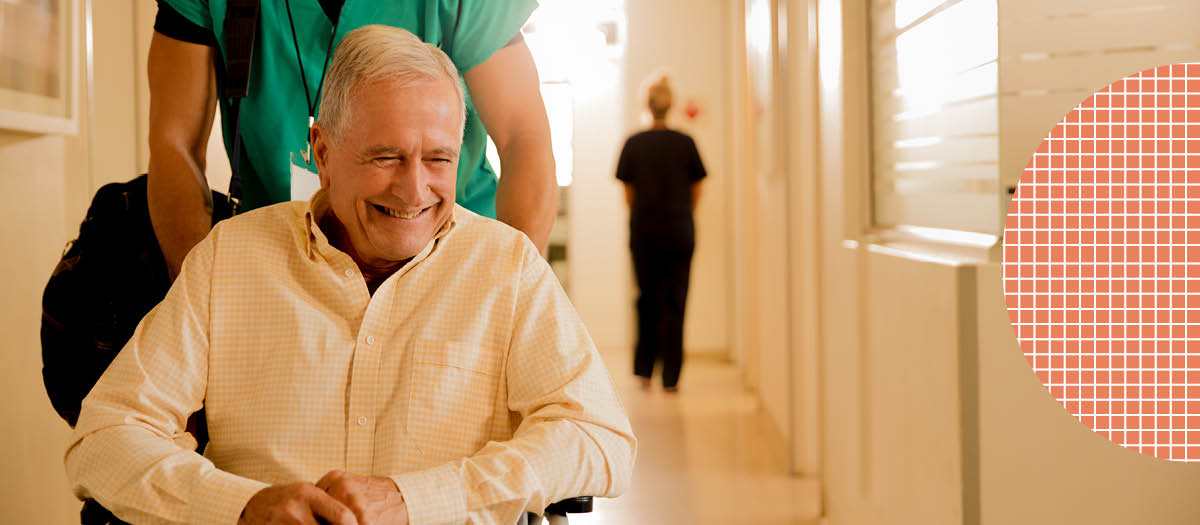A Caregiver's Guide to Supporting Dental Health

Updated August 2021
When acting as a caregiver, it’s necessary to recognize the importance of good oral hygiene for overall dental health. Here is a brief guide to the steps you can take to help someone keep their teeth and gums as strong as possible.
Brushing and flossing daily Is a must
As a caregiver, one of the most important things you can do every day is help with brushing and flossing, especially if you are taking care of a senior or a disabled individual who can’t do it all on their own.
Before brushing or flossing someone else’s teeth, wash your hands thoroughly and put on a pair of disposable gloves. Always be gentle, let them know what you’re going to do before you do it so they’re prepared, and create a routine so they’ll know what to expect.
Brushing tips:
- You can certainly brush someone’s teeth in the bathroom, but it might be easier to do it in the kitchen or dining room. Having them sit down while you brush their teeth might also make things easier for both of you. No matter what, make sure there’s enough light for you to see into their mouth. And have everything you need within reach (toothbrush and flosser, along with a bowl and glass of water for rinsing).
- Apply a pea-sized amount of toothpaste to a soft-bristled toothbrush. Even if you’re using an electric toothbrush, make sure the bristles are soft to ensure it will be gentle on the teeth and gums. Then, use short strokes to clean every surface of each tooth, as well as the tongue.
- If you’re assisting someone with brushing their teeth on their own, you can help them hold the toothbrush more comfortably by wrapping a Velcro strap around their hand. Or, you can give them a toothbrush with a larger handle that’s easier to hold.
- If you’re caring for someone who has trouble swallowing, it might be best to brush their teeth without toothpaste, using plain water instead. And if they have trouble rinsing, you can wet some gauze to gently wipe the mouth clean.
Flossing tips:
- Using string floss can be a good way to floss someone’s teeth after brushing. Cut a piece that’s roughly 18” long to ensure you have enough to clean between all of the teeth.
- If you don’t want to hold the string floss with your fingers, a floss holder might make things easier. Or, you might opt for a water flosser or floss pick.
Note: Every brushing and flossing session is an opportunity for you to carefully examine the mouth. Check for sores and growths, signs of tooth decay or gum disease, and other indicators that a trip to the dentist or doctor is needed.
What about dentures?
If you’re caring for someone who wears dentures, it’s important to take them out of the mouth daily for a thorough cleaning, including brushing and soaking them in a denture cleaning solution. It’s also a great idea to rinse them after meals to keep them as hygienic as possible. And if you ever notice that the dentures are damaged, let the dentist know right away.
Be sure to brush and rinse the individual’s palate, gums, tongue, and any natural teeth that remain after the dentures are taken out. If you want to be sure you’re doing everything right, you can certainly talk to a dentist to learn about the best ways to keep dentures and the mouth clean.
As a caregiver, be sure to make dental appointments
In addition to brushing and flossing daily, the person you’re caring for should see the dentist on a regular basis, and you can go with them.
At each visit, you can talk to the dentist about symptoms that need to be addressed. And you can take care of things like filling out paperwork and submitting insurance information or payments on behalf of the person you’re looking after.
Don’t neglect oral hygiene when taking care of someone
Some people might need just a little bit of help with keeping their teeth and gums clean at home, while others might need you to do it all for them. Either way, the care you provide is extremely important and appreciated.
The key is to make sure the individual is brushing and flossing every day, as well as seeing the dentist often. And, remember, you can always ask a dentist for tips when you aren’t certain about how to get the best results.
Sources:
https://www.fairview.org/~/media/D180BD7345CC49AC967D0576E2D379FF.ashx
https://jada.ada.org/article/S0002-8177(19)30210-7/fulltext
https://www.mouthhealthy.org/en/adults-over-60/caregivers-guide
